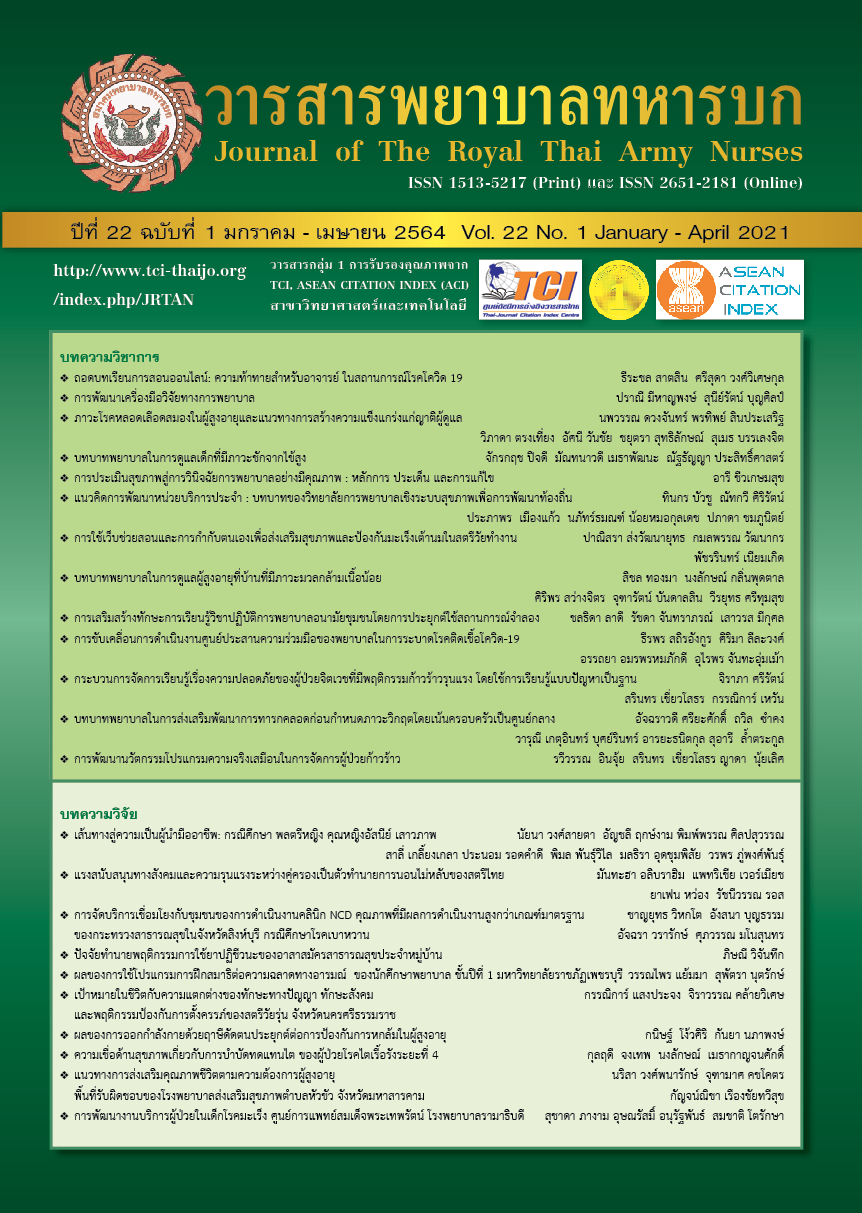The Journey to Professional Leadership: A Case study of Major General Khun Ying Asanee Saovapap
Keywords:
Successful journey, Autobiography, Professional LeaderAbstract
A person’s history can create knowledge concerning of who does what and how until success journey. The purposes of this qualitative research were to examine work life history, working path to success, including describing the professional leader characters of Major General Khunying Asanee Saovapap. Auto-biographical research was used from the history owner and 29 close informants, who permitted to be interviewed, divided into 5 groups and individually interviewed using a different set of semi- structured interview. Data collecting using interviewing and from evidence bared data between the year 2019-2020. Analyzing data used content analysis and life story.
The results revealed that the administrator’s professional leader is the leader’s model with high proficiency at the national level institution. Using her knowledge and ability with succession in Thai cultural contest and outstanding characters, good moral with good life model including network drive supporters as “the wind beneath her wings,” helped through love, faith, trust in herself and her works; lead to accepting her as the outstanding leader. The 6 prominent characters and the professional leaders were having: 1) Broad and progressive vision 2) Appropriate decision with discipline 3) Cooperative concern 4) Public benefits abided as priority 5) Leading for better organization reform. 6) Developing Thai people to have a better quality of life and sustainable living. These made her received praise for the identity leader of the leaders. Applying her characters and a successful journey works as a lesson learned to develop Thai society leaders.
Downloads
References
Akande D, Kuosmanen J, McDermott H, Roser D. Human Rights and 21st Century Challenges. England: Oxford University Press; 2020.
Tommasoll M. Democracy and Gender Equality: The Role of the UN. New York: United Nations – International IDEA; 2013.
Institute of Medicine (US). The Future of Nursing: Leading Change, Advancing Health; 5 Transforming Leadership [internet]. 2011.
Kwok N, Shen W, Brown DJ. Can, I am: Differential predictors of leader efficacy and identity trajectories in leader d he Leadership Quarterly [internet]. 2020.
Pew Research Center. The Path to. Female Leadership. Women’s college enrollment gains leave men behind 2014.
Goodwin J. (Eds.). SAGE Biographical Research. London: SAGE; 2012.
Irvine M. Structural Linguistics, Semiotics, and Communication Theory: Basic Outlines and Assumptions. Washington, DC: Georgetown University; 2004.
Naderifar M, Goli H, Ghaljaie F. Snowball sampling: A purposeful method of sampling in qualitative research. Strides in Development of Medical Education 2017: 14(3); 1-6. doi: 10.5812/sdme. 67670.
Lincoln YS, Guba EG. Naturalistic Inquiry. Newbury Park, CA: Sage; 1985.
Schreier M. Qualitative content analysis in practice. London: Sage; 2012.
Moxley RS. Becoming a Leader Is Becoming Yourself. Jefferson, North Carolina: Mc Farland; 2015.
Müller T, Niessen C. Self-leadership and self-control strength in the work context. Journal of Managerial Psychology 2018: 33(1); 74-92. doi.org/10.1108/JMP-04-2017-0149.
Evans SY, Domingue AD, Mitchell TD. Black Women and Social Justice Education. Legacies and Lessons: SUNY Press; 2019.
Martin M. Key Steps Women Can Take to Be Strong Leaders; Business News Daily Contributing Writer Updated Apr 02, info@ businessnewsdaily.com 200 5th Avenue, 2nd Floor, Waltham, MA 02451
Prajankett O. An educational innovative organization: A new choice of educational administration. Journal of The Royal Thai Army Nurses. 2014.14(3): 116-7. (in Thai)
Sawangchit S., Siripirom W., Siribanpitak P. The Development of Management Strategies for Nursing Colleges under the Jurisdiction of Ministry of Defence According to the Concept of High Performance Organization. Journal of The Royal Thai Army Nurses. 2017 18(3): 180-91. (in Thai)
Tucker JS, Edelen MO, Ellickson PL, Klein DJ. Running away from home: A longitudinal study of adolescent risk factors and young adult outcomes. Journal of youth and adolescence 2011: 40(5); 507-18.
Tria Widyastuti Resilience of A Child From Broken-Home Family: A Phenomenology Study December 2017ijasos- International E-Journal Of Advances In Social Sciences, DOI: 10.18769/ Ijasos.370052
Tiangphan J, Piyasuwa S, Chankantakan K. Psychological Well- Being of Adolescence in Broken Family: Descriptive Phenomenology. Journal of Health and Nursing Research 2019: 35(1); 214-23. (in Thai)
Ashford SJ, De Rue DS. Developing as a leader: The power of mindful engagement. Organizational Dynamics 2012: 41(2); 146-54.
De Rue DS, Ashford SJ. Who will lead and who will follow? A social process of leadership identity construction in organizations. Academy of management review 2010: 35(4); 627-47.
Hannum M, McCollum J. Four Human Centric Practices to Becoming an Effective Leader, Leadership Excellence presented by HR.com JUNE61. HR.com, Inc. EBSCOhost; 2020.
Downloads
Published
How to Cite
Issue
Section
License
บทความหรือข้อคิดเห็นใดใดที่ปรากฏในวารสารพยาบาลทหารบกเป็นวรรณกรรมของผู้เขียน ซึ่งบรรณาธิการหรือสมาคมพยาบาลทหารบก ไม่จำเป็นต้องเห็นด้วย
บทความที่ได้รับการตีพิมพ์เป็นลิขสิทธิ์ของวารสารพยาบาลทหารบก
The ideas and opinions expressed in the Journal of The Royal Thai Army Nurses are those of the authors and not necessarily those
of the editor or Royal Thai Army Nurses Association.






